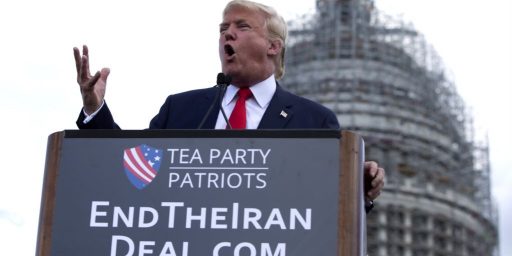Taking on Tehran
Kenneth Pollack and Ray Takeyh have an interesting piece in the current Foreign Affairs, which is online despite not yet having reached my mailbox. (Of course highlighting the on-screen version is difficult, since the yellow shading doesn’t follow the text when I scroll. But I digress.)
[T]here is reason to believe that Tehran’s course can still be changed, if Washington takes advantage of the regime’s vulnerabilities. Although Iran’s hard-line leadership has maintained a remarkable unity of purpose in the face of reformist challengers, it is badly fragmented over key foreign policy issues, including the importance of nuclear weapons. At one end of the spectrum are the hardest of the hard-liners, who disparage economic and diplomatic considerations and put Iran’s security concerns ahead of all others. At the opposite end are pragmatists, who believe that fixing Iran’s failing economy must trump all else if the clerical regime is to retain power over the long term. In between these camps waver many of Iran’s most important power brokers, who would prefer not to have to choose between bombs and butter.
This split provides an opportunity for the United States, and its allies in Europe and Asia, to forge a new strategy to derail Iran’s drive for nuclear weapons. The West should use its economic clout to strengthen the hand of Iranian pragmatists, who could then argue for slowing, limiting, or shelving Tehran’s nuclear program in return for the trade, aid, and investment that Iran badly needs. Only if the mullahs recognize that they have a stark choice–they can have nuclear weapons or a healthy economy, but not both–might they give up their nuclear dreams. With concern over Iran’s nuclear aspirations growing, the United States and its allies now have a chance to present Iran with just such an ultimatum.
[…]
[T]he strategy requires that both the potential rewards and the potential penalties be significant. Iranian hard-liners will not abandon their nuclear program easily. Although the mullahs are not as stubborn as North Korean leader Kim Jong Il continues to be–they would not knowingly allow three million fellow citizens to die of starvation just to preserve their nuclear program–they unquestionably are willing to tolerate considerable hardship to keep their nuclear hopes alive. In order to change Tehran’s behavior, therefore, the inducements will have to be potent: big rewards that could revive the economy or heavy sanctions that would surely cripple it.
Gregory Djerejian thinks the Bush Administration has signalled that it’s trying to do precisely what Pollack and Takeyh suggest and observes,
Rather than fully radicalize Iranian leaders, the reality of U.S. GI’s on both their East and West has proven something of a reality check as compared to the old days when the merits or demerits of dual containment were debated in far away Washington think tanks. Put simply, when you have approximately 200,000 American troops near your borders, hyper-revolutionary zeal and saber-rattling takes a back seat to sober statecraft–if still occasionally on the zealous side.
Ted Barlow disagrees with Djerejian on the first point, at least, noting Bush’s “pointed rejection of the comparable North Korean framework.” Matt Yglesias concurs. I don’t follow. In the Korean case, Bush is standing firm for six nation talks vice bilateral negotiations with the DPRK. Pollack and Takeyh recommend precisely that stance with Iran.
Further, as the last paragraph in my excerpt above makes clear, the Iranian regime has proven much more rational over the last decade than its North Korean counterpart. Dealing with them is not impossible. Indeed, my pessimism over the Pollack-Takeyh framework is getting the Russians, Chinese, and Europeans to go along rather than the recalcitrance of either Bush or Khatami.





TITANS OF THE BLOGOS VS. THE MAD MULLAHS OF IRAN
LET’S RUMBLE – “ WE WILL ROCK YOU – WE WILL ROCK YOU . . .!”
Read More
No expert opinion, just mine. It strikes me that the DPRK issue is six party because the regional peers to the DPRK are stable and willing to participate in pressuring them toward compliance. And the stick comes before the carrot (which is needed much more).
With regard to Iran, the EU-3 plan, and similarly the P-T framework, requires participants outside the region who are willing to offer carrots (because they also gain cabbage) but aren’t as of yet holding much of a stick. Bush is right to resist such an approach unless they back his being the stick.